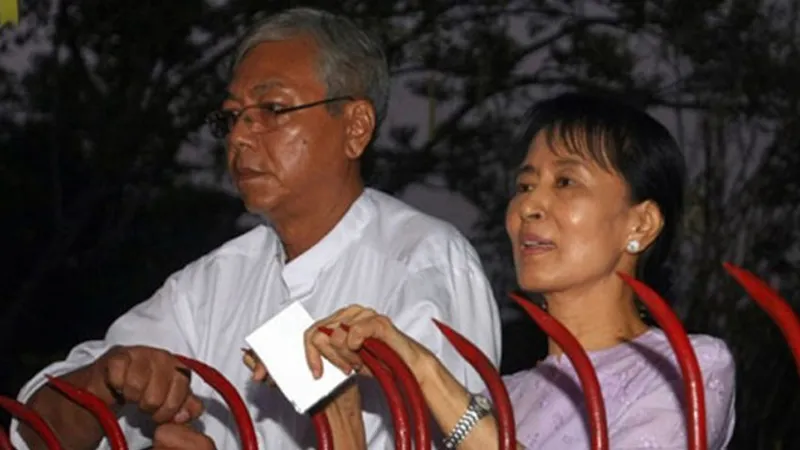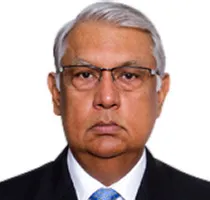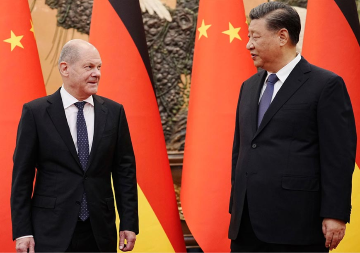Myanmar crossed a Rubicon like stage when U Htin Kyaw, a close friend and adviser of Aung San Suu Kyi, Nobel Prize winner and Myanmar’s iconic leader, a virtual “Ma Durga”, was elected as President, bringing to an end a long era of military generals occupying the Presidential chair. For the first time since 1962, when the Burmese (Myanmar later) military took over, the country will have a civilian President.
To call this event historic is an understatement. The new President emerged the winner with 360 votes out of 652 votes cast. The President-elect U is a highly educated former civil servant and a longstanding family friend of Suu Kyi. His choice is a wise one since his political views converge with that of Suu Kyi. U Htin’s wife is a Member of Parliament.
The military’s candidate Myint Swe bagged 213 votes and will be nominated as the First Vice-President. The second Vice-President will be Henry Van Tio of the NLD who garnered 79 votes. Major General (retd) Myint Swe is a known hardliner and is on a US blacklist. Henry Van Tio is an ethnic Chin and a Christian and not likely to play a major role.
Myanmar stands on the cusp of a historical democratic transformation which many regard as a flawed one. The transition began in 2011, following 52 years of military rule during which Myanmar’s fate was linked with the military junta that ruled the country with an iron hand that had become an anachronism in the contemporary world. The military junta earned a reputation for ruthless suppression of dissent and the country suffered enormous economic damage resulting from international sanctions. With the changing global climate and increasing fears of the Chinese dragon breathing down Myanmar’s neck, the military junta embarked on the road to transition that culminated with the 2015 election, generally regarded as fair.
The shining star of this transition is the iconic Aung Sang Suu Kyi who became synonymous with the struggle for democracy in Myanmar, during the long years she was incarcerated for being the leader and the global symbol of struggle for democracy. She would have been elected President, if the Constitution, crafted by the military junta, had not inserted clauses that made her ineligible on the grounds of having had a foreign spouse and children. The NLD was unable to prevent inclusion of this clause in the Constitution because the numbers they required in the Parliament was not there, though the NLD did win a Parliamentary majority. The military junta resisted any change and successfully retained this clause, believed to be designed to prevent Suu Kyi from becoming President, leaving her with no option but to nominate Htin Kyaw as the NLD Presidential nominee.
The overwhelming view is that Suu Kyi will be the power behind the new President and will call the shots in the new government. She has already made moves to put her stamp on government formation. The current 36 Ministries will be cut down to 21, without touching some crucial Ministries like Defence, Home and Border Affairs which remain in the grip of the military. It has been announced that Suu Kyi will be the new Foreign Minister, with additional responsibilities for a few more Ministries.
This will enable her to be part of the governmental structure that gives her the right to influence strategic decisions. Thus selecting Chief Ministers of the 14 states will be decided by the NLD, though the NLD failed to win majorities in the Rakhine, Kachin and Shan states. In July 2015, the military thwarted attempts to bring in amendments to the Constitution that would have led to election of Chief Ministers by the states. This aspect will lead to dissatisfaction and political opposition in states where the parties other than the NLD have majorities in the Assemblies.
The new government will face a host of challenges on several fronts – ethnic reconciliation, economy, communal tensions and relations with neighbours China, India, Thailand and Bangladesh. The new government’s relations with the military will require delicate management. In fact Myanmar’s future is inextricably linked to civil-military relations for quite some to come. The tussle for influence and power will be waged by two leading figures, Suu Kyi and the Army Chief General Min Aung Hlaing, even as they are forced to cooperate in the exercise of power within the governance structure. Reconciliation and competition will become the state of play, a game both sides have learned in the tussle for adjustment.
The former military strongman and former President, General Thein Sein and the Army Chief Aung Hlaing were uncooperative when Suu Kyi sought meetings to discuss the transfer of power after the NLD’s victory at the polls. Suu Kyi managed to finesse the issue by reaching out to the former Army Chief, Senior General and former President Than Shwe. His intervention quickly sorted out the issue and meetings were organised to take the democratic process forward. Even in retirement General Than Shwe wields enough influence even now.
Critics of the democratic transition in Myanmar see the pace of change as too slow. They would want the Army back in barracks and wielding no political power. This is an unrealistic view and should not be given too much weight. It is in Myanmar’s long term interest to adopt gradualism as the guiding principle and craft a model of civil-military cooperative governance, because there is no other option. Any abrupt transition can bring chaos and anarchy.
It seems clear that the military is not going to be in a hurry to return to the barracks and will continue to retain powers in crucial areas, affecting domestic political and economic issues, security and overall strategy. The NLD will be handicapped by the lack of experience in governance and trained cadres. The current governance structure, developed over decades of military rule, cannot be replaced quickly.
The most serious domestic issue is the one about the rights of ethnic minorities. How Myanmar deals with its ethnic minorities, the non-Burmans, comprising a majority of the population of 51 million, will determine Myanmar’s political and economic future. There are advocates of “federalism” and regional autonomy who believe that this is the only way to reintegrate all ethnic groups into the country’s mainstream.
It was Suu Kyi’s father, Aung San, who led Burma to independence and tried his utmost in 1947, to bring about reconciliation with the major ethnic leaders via a plan for self-governance, rights and privileges of citizenships of an independent country. This agreement, also called the Panglong agreement, named after the town where the meeting took place, did not take off. It fell victim to the assassination of Aung San and led to the spiralling downturn of ethnic violence that has yet to end.
Both Bangladesh and India share borders with Myanmar. India’s effort to engage the government in Myanmar has often faltered over slow delivery on various projects and lack of interest shown by India’s private sector in investing in Myanmar. The Tri-lateral Highway project between India, Myanmar and Thailand is an important infrastructure project that needs to be implemented speedily. The Indian government seems to be putting renewed emphasis on this aspect of connectivity. At this important juncture in its democratic transition, Myanmar needs a lot of assistance which its neighbours and major countries should freely extend. Maintaining the course, sustainability and stability of democratic reforms is essential for Myanmar to emerge as a modern stable nation. This is vital for the long term strategic interest of both Bangladesh and India.
This commentary originally appeared in the Daily Sun.
The views expressed above belong to the author(s). ORF research and analyses now available on Telegram! Click here to access our curated content — blogs, longforms and interviews.




 PREV
PREV


